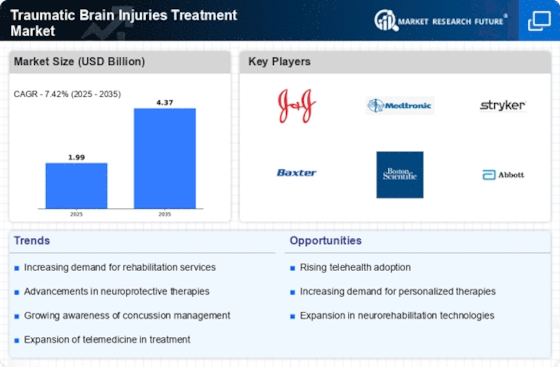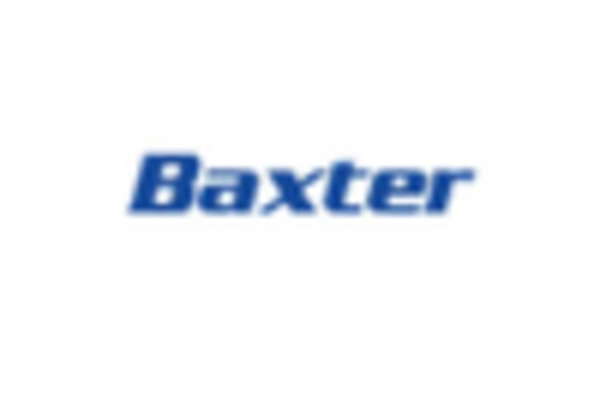Immediate Emergency Care
Medications
Diuretics
Anti-Seizure Drugs
Coma-Inducing Drugs
Anti-Anxiety Agents
Anti-Depressant
Anti-Psychotics
Analgesic
Anti-Convulsants
Anti-Coagulants
Surgery
Removing Clotted Blood
Repairing Skull Fracture
Bleeding in the Brain
Opening a Window in the Skull
Rehabilitation
Hospitals
Neurologist
Independent Pharmacies
Rehabilitative Center Treatment
Others
Traumatic Brain Injuries Treatment Market by TreatmentImmediate Emergency Care
Medications
Diuretics
Anti-Seizure Drugs
Coma-Inducing Drugs
Anti-Anxiety Agents
Anti-Depressant
Anti-Psychotics
Analgesic
Anti-Convulsants
Anti-Coagulants
Surgery
Removing Clotted Blood
Repairing Skull Fracture
Bleeding in the Brain
Opening a Window in the Skull
Rehabilitation
Traumatic Brain Injuries Treatment Market by End-UserHospitals
Neurologist
Independent Pharmacies
Rehabilitative Center Treatment
Others
Traumatic Brain Injuries Treatment Market by TreatmentImmediate Emergency Care
Medications
Diuretics
Anti-Seizure Drugs
Coma-Inducing Drugs
Anti-Anxiety Agents
Anti-Depressant
Anti-Psychotics
Analgesic
Anti-Convulsants
Anti-Coagulants
Surgery
Removing Clotted Blood
Repairing Skull Fracture
Bleeding in the Brain
Opening a Window in the Skull
Rehabilitation
Traumatic Brain Injuries Treatment Market by End-UserHospitals
Neurologist
Independent Pharmacies
Rehabilitative Center Treatment
Others
Traumatic Brain Injuries Treatment Market by TreatmentImmediate Emergency Care
Medications
Diuretics
Anti-Seizure Drugs
Coma-Inducing Drugs
Anti-Anxiety Agents
Anti-Depressant
Anti-Psychotics
Analgesic
Anti-Convulsants
Anti-Coagulants
Surgery
Removing Clotted Blood
Repairing Skull Fracture
Bleeding in the Brain
Opening a Window in the Skull
Rehabilitation
Traumatic Brain Injuries Treatment Market by End-UserHospitals
Neurologist
Independent Pharmacies
Rehabilitative Center Treatment
Others
Traumatic Brain Injuries Treatment Market by TreatmentImmediate Emergency Care
Medications
Diuretics
Anti-Seizure Drugs
Coma-Inducing Drugs
Anti-Anxiety Agents
Anti-Depressant
Anti-Psychotics
Analgesic
Anti-Convulsants
Anti-Coagulants
Surgery
Removing Clotted Blood
Repairing Skull Fracture
Bleeding in the Brain
Opening a Window in the Skull
Rehabilitation
Traumatic Brain Injuries Treatment Market by End-UserHospitals
Neurologist
Independent Pharmacies
Rehabilitative Center Treatment
Others
Germany Outlook (USD Billion, 2018-2032)
Traumatic Brain Injuries Treatment Market by TreatmentImmediate Emergency Care
Medications
Diuretics
Anti-Seizure Drugs
Coma-Inducing Drugs
Anti-Anxiety Agents
Anti-Depressant
Anti-Psychotics
Analgesic
Anti-Convulsants
Anti-Coagulants
Surgery
Removing Clotted Blood
Repairing Skull Fracture
Bleeding in the Brain
Opening a Window in the Skull
Rehabilitation
Traumatic Brain Injuries Treatment Market by End-UserHospitals
Neurologist
Independent Pharmacies
Rehabilitative Center Treatment
Others
Traumatic Brain Injuries Treatment Market by TreatmentImmediate Emergency Care
Medications
Diuretics
Anti-Seizure Drugs
Coma-Inducing Drugs
Anti-Anxiety Agents
Anti-Depressant
Anti-Psychotics
Analgesic
Anti-Convulsants
Anti-Coagulants
Surgery
Removing Clotted Blood
Repairing Skull Fracture
Bleeding in the Brain
Opening a Window in the Skull
Rehabilitation
Traumatic Brain Injuries Treatment Market by End-UserHospitals
Neurologist
Independent Pharmacies
Rehabilitative Center Treatment
Others
Traumatic Brain Injuries Treatment Market by TreatmentImmediate Emergency Care
Medications
Diuretics
Anti-Seizure Drugs
Coma-Inducing Drugs
Anti-Anxiety Agents
Anti-Depressant
Anti-Psychotics
Analgesic
Anti-Convulsants
Anti-Coagulants
Surgery
Removing Clotted Blood
Repairing Skull Fracture
Bleeding in the Brain
Opening a Window in the Skull
Rehabilitation
Traumatic Brain Injuries Treatment Market by End-UserHospitals
Neurologist
Independent Pharmacies
Rehabilitative Center Treatment
Others
Traumatic Brain Injuries Treatment Market by TreatmentImmediate Emergency Care
Medications
Diuretics
Anti-Seizure Drugs
Coma-Inducing Drugs
Anti-Anxiety Agents
Anti-Depressant
Anti-Psychotics
Analgesic
Anti-Convulsants
Anti-Coagulants
Surgery
Removing Clotted Blood
Repairing Skull Fracture
Bleeding in the Brain
Opening a Window in the Skull
Rehabilitation
Traumatic Brain Injuries Treatment Market by End-UserHospitals
Neurologist
Independent Pharmacies
Rehabilitative Center Treatment
Others
Traumatic Brain Injuries Treatment Market by TreatmentImmediate Emergency Care
Medications
Diuretics
Anti-Seizure Drugs
Coma-Inducing Drugs
Anti-Anxiety Agents
Anti-Depressant
Anti-Psychotics
Analgesic
Anti-Convulsants
Anti-Coagulants
Surgery
Removing Clotted Blood
Repairing Skull Fracture
Bleeding in the Brain
Opening a Window in the Skull
Rehabilitation
Traumatic Brain Injuries Treatment Market by End-UserHospitals
Neurologist
Independent Pharmacies
Rehabilitative Center Treatment
Others
Traumatic Brain Injuries Treatment Market by TreatmentImmediate Emergency Care
Medications
Diuretics
Anti-Seizure Drugs
Coma-Inducing Drugs
Anti-Anxiety Agents
Anti-Depressant
Anti-Psychotics
Analgesic
Anti-Convulsants
Anti-Coagulants
Surgery
Removing Clotted Blood
Repairing Skull Fracture
Bleeding in the Brain
Opening a Window in the Skull
Rehabilitation
Traumatic Brain Injuries Treatment Market by End-UserHospitals
Neurologist
Independent Pharmacies
Rehabilitative Center Treatment
Others
Traumatic Brain Injuries Treatment Market by TreatmentImmediate Emergency Care
Medications
Diuretics
Anti-Seizure Drugs
Coma-Inducing Drugs
Anti-Anxiety Agents
Anti-Depressant
Anti-Psychotics
Analgesic
Anti-Convulsants
Anti-Coagulants
Surgery
Removing Clotted Blood
Repairing Skull Fracture
Bleeding in the Brain
Opening a Window in the Skull
Rehabilitation
Traumatic Brain Injuries Treatment Market by End-UserHospitals
Neurologist
Independent Pharmacies
Rehabilitative Center Treatment
Others
Traumatic Brain Injuries Treatment Market by TreatmentImmediate Emergency Care
Medications
Diuretics
Anti-Seizure Drugs
Coma-Inducing Drugs
Anti-Anxiety Agents
Anti-Depressant
Anti-Psychotics
Analgesic
Anti-Convulsants
Anti-Coagulants
Surgery
Removing Clotted Blood
Repairing Skull Fracture
Bleeding in the Brain
Opening a Window in the Skull
Rehabilitation
Traumatic Brain Injuries Treatment Market by End-UserHospitals
Neurologist
Independent Pharmacies
Rehabilitative Center Treatment
Others
Traumatic Brain Injuries Treatment Market by TreatmentImmediate Emergency Care
Medications
Diuretics
Anti-Seizure Drugs
Coma-Inducing Drugs
Anti-Anxiety Agents
Anti-Depressant
Anti-Psychotics
Analgesic
Anti-Convulsants
Anti-Coagulants
Surgery
Removing Clotted Blood
Repairing Skull Fracture
Bleeding in the Brain
Opening a Window in the Skull
Rehabilitation
Traumatic Brain Injuries Treatment Market by End-UserHospitals
Neurologist
Independent Pharmacies
Rehabilitative Center Treatment
Others
Traumatic Brain Injuries Treatment Market by TreatmentImmediate Emergency Care
Medications
Diuretics
Anti-Seizure Drugs
Coma-Inducing Drugs
Anti-Anxiety Agents
Anti-Depressant
Anti-Psychotics
Analgesic
Anti-Convulsants
Anti-Coagulants
Surgery
Removing Clotted Blood
Repairing Skull Fracture
Bleeding in the Brain
Opening a Window in the Skull
Rehabilitation
Traumatic Brain Injuries Treatment Market by End-UserHospitals
Neurologist
Independent Pharmacies
Rehabilitative Center Treatment
Others
Traumatic Brain Injuries Treatment Market by TreatmentImmediate Emergency Care
Medications
Diuretics
Anti-Seizure Drugs
Coma-Inducing Drugs
Anti-Anxiety Agents
Anti-Depressant
Anti-Psychotics
Analgesic
Anti-Convulsants
Anti-Coagulants
Surgery
Removing Clotted Blood
Repairing Skull Fracture
Bleeding in the Brain
Opening a Window in the Skull
Rehabilitation
Traumatic Brain Injuries Treatment Market by End-UserHospitals
Neurologist
Independent Pharmacies
Rehabilitative Center Treatment
Others
Traumatic Brain Injuries Treatment Market by TreatmentImmediate Emergency Care
Medications
Diuretics
Anti-Seizure Drugs
Coma-Inducing Drugs
Anti-Anxiety Agents
Anti-Depressant
Anti-Psychotics
Analgesic
Anti-Convulsants
Anti-Coagulants
Surgery
Removing Clotted Blood
Repairing Skull Fracture
Bleeding in the Brain
Opening a Window in the Skull
Rehabilitation
Traumatic Brain Injuries Treatment Market by End-UserHospitals
Neurologist
Independent Pharmacies
Rehabilitative Center Treatment
Others
Traumatic Brain Injuries Treatment Market by TreatmentImmediate Emergency Care
Medications
Diuretics
Anti-Seizure Drugs
Coma-Inducing Drugs
Anti-Anxiety Agents
Anti-Depressant
Anti-Psychotics
Analgesic
Anti-Convulsants
Anti-Coagulants
Surgery
Removing Clotted Blood
Repairing Skull Fracture
Bleeding in the Brain
Opening a Window in the Skull
Rehabilitation
Traumatic Brain Injuries Treatment Market by End-UserHospitals
Neurologist
Independent Pharmacies
Rehabilitative Center Treatment
Others
Traumatic Brain Injuries Treatment Market by TreatmentImmediate Emergency Care
Medications
Diuretics
Anti-Seizure Drugs
Coma-Inducing Drugs
Anti-Anxiety Agents
Anti-Depressant
Anti-Psychotics
Analgesic
Anti-Convulsants
Anti-Coagulants
Surgery
Removing Clotted Blood
Repairing Skull Fracture
Bleeding in the Brain
Opening a Window in the Skull
Rehabilitation
Traumatic Brain Injuries Treatment Market by End-UserHospitals
Neurologist
Independent Pharmacies
Rehabilitative Center Treatment
Others
Traumatic Brain Injuries Treatment Market by TreatmentImmediate Emergency Care
Medications
Diuretics
Anti-Seizure Drugs
Coma-Inducing Drugs
Anti-Anxiety Agents
Anti-Depressant
Anti-Psychotics
Analgesic
Anti-Convulsants
Anti-Coagulants
Surgery
Removing Clotted Blood
Repairing Skull Fracture
Bleeding in the Brain
Opening a Window in the Skull
Rehabilitation
Traumatic Brain Injuries Treatment Market by End-UserHospitals
Neurologist
Independent Pharmacies
Rehabilitative Center Treatment
Others
Traumatic Brain Injuries Treatment Market by TreatmentImmediate Emergency Care
Medications
Diuretics
Anti-Seizure Drugs
Coma-Inducing Drugs
Anti-Anxiety Agents
Anti-Depressant
Anti-Psychotics
Analgesic
Anti-Convulsants
Anti-Coagulants
Surgery
Removing Clotted Blood
Repairing Skull Fracture
Bleeding in the Brain
Opening a Window in the Skull
Rehabilitation
Traumatic Brain Injuries Treatment Market by End-UserHospitals
Neurologist
Independent Pharmacies
Rehabilitative Center Treatment
Others


















Leave a Comment